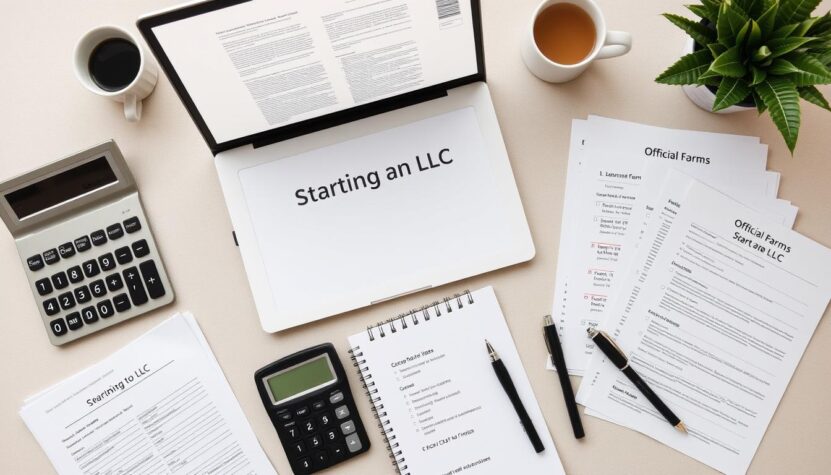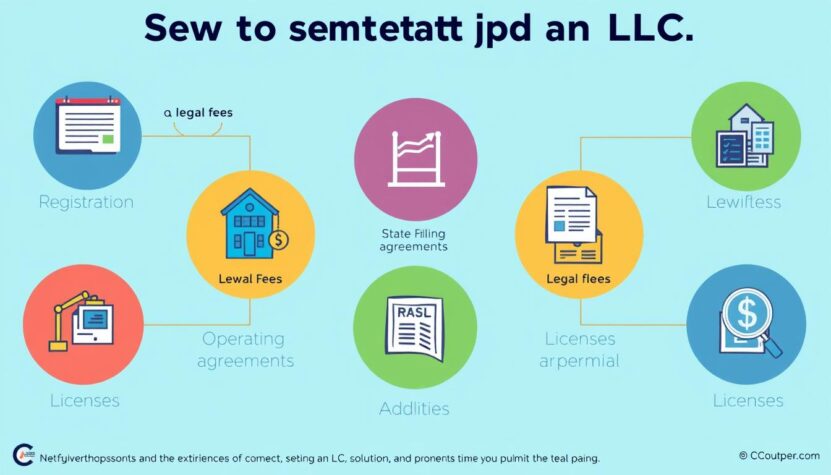Starting your journey as an entrepreneur can be exciting, but it also raises many questions, particularly when it comes to finances. If you’re considering the formation of a Limited Liability Company (LLC), one of the pivotal inquiries you need to address is, how much does it cost to set up an LLC? Understanding the various LLC setup costs is crucial in making informed decisions about your business structure and budgeting effectively.
On average, you can anticipate spending approximately $129 for initial LLC registration costs and around $104 for annual maintenance. However, these numbers can vary significantly based on the state you choose to register in, since state filing fees for LLCs typically fluctuate between $35 and $500. In Texas, for example, the filing fee stands at $300, along with other fees that vary for business name reservations and operating agreements. Many entrepreneurs overlook these added expenses, which can impact your overall investment. By being aware of the total costs associated with setting up an LLC, you can prioritize your investments wisely and create a robust business plan that supports your entrepreneurial ambitions.
While the attraction of an LLC often lies in its combination of liability protection and favorable tax treatment, each cost component from LLC registration costs to operational fees plays a pivotal role in your business’s foundation. In the following sections, we’ll delve deeper into the specifics of LLC setup costs, breaking down each component to ensure you have a comprehensive understanding of what to expect as you embark on this rewarding journey.
Understanding LLC Setup Costs
Setting up an LLC involves various costs that business owners must navigate. Understanding these expenses is critical for planning your budget as you embark on your entrepreneurial journey.
What is an LLC?
An LLC, or limited liability company, serves as a versatile business structure that shields personal assets from liabilities incurred by the business. This protection appeals to many entrepreneurs seeking a balance between operational flexibility and liability protection, making the LLC a favored choice.
Reasons to Form an LLC
Business owners often opt for an LLC to simplify their operations while taking advantage of its tax benefits. This structure allows profits to be taxed only at the individual level, avoiding the double taxation that corporations often face. The separation of personal and business liabilities appeals to those wanting to safeguard their personal finances from potential business debts.
Overview of Typical LLC Formation Fees
It’s essential to be aware of the typical fees associated with forming an LLC. These costs can vary widely, with state filing fees generally ranging from $40 to $500. The average cost to form an LLC in the U.S. is about $132. Below is a breakdown of potential LLC business expenses:
| Expense Type | Cost Range | Average Cost |
|---|---|---|
| State Filing Fees | $40 – $520 | $132 |
| Annual Fees | $0 – $800 | $91 |
| Lawyer Fees | $1,000 – $1,500 | Varies |
| Online Incorporation Services | $99 – $900 | Varies |
| Registered Agent Services | $100 – $300 | Varies |
| Operating Agreement Costs | $0 – $500 | Varies |
| EIN Acquisition Fees | $0 – $100 | Varies |
| Filing Articles of Organization | $40 – $500 | Varies |
| Fictitious Business Name Application | $50 – $100 | Varies |
Being informed about these LLC fees breakdowns will aid in estimating how much does it cost to form an LLC accurately. Several states even waive ongoing annual fees, while others require biennial payments, influencing the overall cost structure.
How Much Does It Cost to Set Up an LLC?
Understanding the costs associated with starting an LLC is essential for effective budgeting and planning. From state filing fees to optional additional expenses, the total costs can vary greatly depending on various factors.
State Filing Fees Overview
The initial state filing fees are a significant part of your overall LLC registration costs. This fee typically averages around $129 but can differ widely by state. For instance, Montana offers a low filing fee of $35, while Massachusetts sets a high bar at $500. Your decision on where to establish your LLC can greatly influence starting an LLC costs.
Factors Influencing LLC Formation Costs
When evaluating LLC registration costs, several factors come into play. State-specific requirements affect filing fees. Whether you choose to DIY or hire a professional service can change the landscape of preparation costs. Opting for a lawyer may push costs between $1,000 and $1,500, while using filing services may range around $300. Additional requirements based on your business type could add to your total expense.
Average Range of LLC Filing Fees by State
The average range of LLC filing fees by state showcases significant variations. For example, fees can go as low as $10 in Colorado but reach up to $300 in Texas. Understanding these numbers helps with planning and reflects the importance of selecting the right state for your LLC to minimize costs.

Additional Fees and Expenses Related to LLC Formation
When establishing an LLC, you must consider various additional LLC costs beyond the basic setup fees. These ongoing expenses can significantly impact your financial planning. Familiarizing yourself with these costs enables you to make informed decisions regarding your LLC business expenses.
Registered Agent Services
A registered agent is essential for receiving legal notices and documents for your LLC. Utilizing registered agent services typically costs between $75 and $150 annually, ensuring your business maintains compliance with state regulations. If you prefer, you can act as your own registered agent, which can be a more cost-effective option.
Operating Agreement Costs
Your LLC’s operating agreement is critical in outlining management responsibilities and operational procedures. The cost of drafting this document can vary widely, ranging from approximately $50 to $1,000 depending on whether you prepare it yourself or hire a lawyer. This investment can prove essential in avoiding disputes and clarifying roles within your business.
Business Licenses and Permits
Depending on your industry and location, obtaining necessary business licenses and permits can represent a vital portion of your LLC business expenses. In California, for instance, the cost of a business license typically ranges from $50 to $100 and must be renewed annually. Compliance with local regulations is crucial for smooth operations.
Annual Compliance Fees
LLCs incur annual compliance fees to remain in good standing. In California, for instance, you face an annual tax of $800, due by the 15th day of the fourth month after formation. If your LLC generates gross income of $250,000 or more, additional fees can arise, reflecting your income levels. Monitoring these ongoing costs helps you maintain compliance and avoid penalties.

Conclusion
When considering how much does it cost to form an LLC, it’s essential to account for both the initial formation fees and ongoing expenses that may arise. The overall cost can be significantly higher than that of a sole proprietorship or general partnership, as many states impose various charges such as annual report and franchise tax fees. Understanding the complete LLC fees breakdown not only helps in planning your budget but also ensures that your business remains compliant with state regulations.
From the requirement of a registered agent to the need for an operating agreement, each aspect involves associated costs. It’s crucial to recognize that maintaining an LLC requires diligence in keeping up with compliance obligations, which may include regular filings and potentially complex record-keeping. Despite these requirements, forming an LLC offers valuable benefits such as pass-through taxation and limited liability protection, making it a more attractive option for many business owners.
As you navigate the intricacies of LLC formation, remember that the foundational knowledge you’ve gained about fees and regulations can lead to better investment strategies for your venture. By staying informed and prepared, you can maximize the advantages that come with being part of this flexible business structure.
Related Posts:
- Acquisition Cost Meaning - How to Calculate and Use…
- TooTurntTony Net Worth 2025: How Much Does He Really Make?
- How Does LinkedIn Make Money - Exploring Its Revenue Streams
- Why Does My Car Shake When I Drive Fast? Common…
- How Much Is Saubhagyaa R Swain Worth in 2024?
- Greek YouTubers and the Art of Building a Loyal Fanbase









